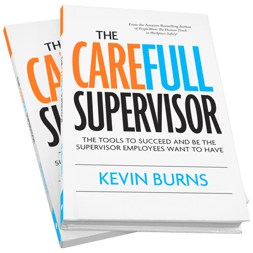Are you leveraging your most powerful asset in building a robust safety culture? Your frontline supervisors hold the key to transforming safety from a set of rules into a shared commitment. A supervisor's soft skills - building trust, fostering respect, and empowering team members - can dramatically influence safety outcomes. A supervisor's leadership abilities aren't just good for safety—it's crucial for overall organizational success.

Frontline supervisors are the cornerstone of a company's safety culture, with influence far beyond enforcing rules and procedures. Their power lies in the soft skills they bring - the ability to build trust, foster respect, empower team members, and coach for continuous improvement.
As my newest book, The CareFull Supervisor, emphasizes, these leaders have the influence to transform workplace safety from a list of regulations into a shared commitment built on strong relationships and mutual care. Their approach to leadership can make the difference between a thriving safety culture and one that merely meets minimum compliance.
5 ways supervisors influence safety culture
1. Building Trust Through Authentic Care:
Trust is the foundation of any strong safety culture. Supervisors who genuinely care about their team members' well-being create an environment where safety becomes a shared value rather than an imposed rule. As The CareFull Supervisor states, "When you care openly about your team, you create the basis for a strong supervisor-employee relationship." This trust allows team members to speak up about safety concerns without fear of repercussion.
2. Building Respect Through Active Listening:
Respect is a two-way street, and supervisors who actively listen to their team members' concerns and ideas create a culture of mutual respect. This goes beyond simply hearing words; it involves truly valuing input and taking action on suggestions. The book emphasizes, "To get buy-in from your crew collectively, you are going to have to engage each member of the team in one-on-one conversations."
3. Empowering Through Delegation and Trust:
Empowerment is about giving team members the autonomy to make safety-related decisions. Supervisors who trust their teams to take ownership of safety practices create a sense of responsibility and pride in maintaining a safe workplace. As the book notes, "Employees want their supervisors to be someone who empowers the team by handing out tasks and responsibilities and trusting us to do what we say we will—someone who doesn't feel the need to micromanage us like we're little kids."
4. Coaching for Growth and Development:
Effective supervisors see themselves as coaches, helping each team member grow and develop their safety skills. This involves providing constructive feedback, offering learning opportunities, and helping individuals recognize their potential to contribute to a safer workplace. The CareFull Supervisor reads, "Your job as a supervisor is to take each member of your team aside each day and give them guidance and inspiration to want to be better."
5. Creating a Supportive Team Environment:
Supervisors have the power to foster a team atmosphere where members look out for each other's safety. This involves encouraging peer-to-peer recognition for safe practices, facilitating open discussions about safety challenges, and celebrating collective safety achievements. The book emphasizes, "When you have trust among all the members of the team, you have a tight unit that protects every member of the team—and gets their work done at a high level."
These five areas of influence demonstrate that the role of a frontline supervisor in safety is primarily about people skills rather than technical knowledge. They are relationship-builders, motivators, and mentors who can profoundly impact how safety is perceived and practiced throughout an organization.
The responsibility of influence
The power of influence cannot be overstated. When supervisors fully embrace their role as safety leaders focused on these soft skills, they can transform even the most challenging work environments. They have the ability to turn a group of individuals into a cohesive team that looks out for one another, takes pride in working safely, and actively contributes to ongoing safety improvements.
However, this level of influence also comes with significant responsibility. Supervisors must consistently model the behaviors they wish to see in their teams. This means being vulnerable, admitting mistakes, and showing a genuine commitment to continuous improvement in their own leadership skills.
To truly harness their influence, supervisors must adopt what the book calls a "CareFull" approach. This means genuinely caring about the quality of work, the way it's performed (safely), and the people doing the work. It's about creating an environment where safety isn't just a priority – it's a core value that's woven into the fabric of daily operations and relationships.
Supervisors need the skills to succeed
Organizations that recognize and nurture the critical role of frontline supervisors in shaping safety culture through these soft skills are setting themselves up for success. By providing supervisors with the tools, training, and support they need to excel in building trust, fostering respect, empowering team members, and coaching effectively, companies can create a ripple effect of positive safety attitudes and behaviors throughout their workforce.
Frontline supervisors are the key to unlocking a robust and sustainable safety culture by mastering essential soft skills. Their influence touches every aspect of workplace safety, from technical compliance to the intangible but crucial elements of trust, respect, and empowerment. By embracing their role as relationship-focused safety leaders and adopting a CareFull approach, supervisors can create work environments where safety is not just a requirement, but a shared value that everyone takes pride in upholding.
To dive deeper into these concepts and learn how to become a CareFull supervisor, check out "The CareFull Supervisor" book. It offers a wealth of insights and practical strategies for frontline leaders looking to enhance their soft skills and build a stronger safety culture. For those seeking hands-on training in these critical areas, the PeopleWork Supervisor Academy provides comprehensive soft skills training designed specifically for supervisors. Investing in these resources can be a game-changer for supervisors and the teams they lead, ultimately creating safer, more productive workplaces.





